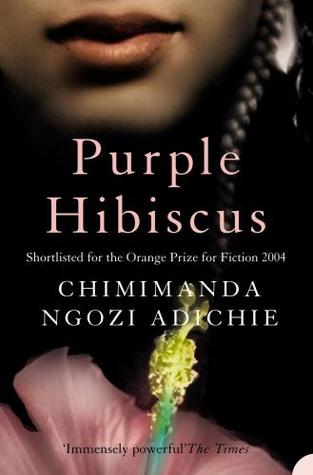The plot centers around a financially well off family in the city of Enugu in the country of Nigeria. The story is told through the eyes of Kambili Achike, the youngest child and only daughter in a family of four. The plot slowly twists, turning the emotional tension of the novel up a degree with every page. About half way through the novel, the tension is sprung as the result of a small infraction committed by Kambili. Her father Eugene beats her so badly she has to be hospitalized.
The beating results, in turn in an extended stay with her paternal Aunt Ifeoma. As her aunt states after the incident, “When a house is on fire, you run out before the roof collapses on your head” (pp. 213-214). Here Kambili and her older brother, Jaja, have their first real taste of freedom and love. “I had felt as if I were not there, that I was just observing a table where you could say anything at any time to anyone, where the air was free for you to breathe as you wished” (p. 120). But it is not meant to last and after a period they are brought home. However, their journey home comes after both siblings have realized their father is not simply difficult but dangerous. In the end steps and taken to protect themselves. Events are quickly brought to a boil once again. When the story draws to a close, Jaja is forced to protect his mother and sister by spending time in prison. Thankfully the novel does not end in complete tragedy but a feeling of hope and expectation of redemption.

Adichie’s portrait of a broken family is an arresting one. It is interesting to see how community and extended family play an outsized role in the disfunction compared to what an American novelist might have written. But broken family dynamics are sadly universal. One could map out the classic roles of villain, hero, victim. One can easily contrast the monetarily poor, but happy and free Ifeoma and her children with the monetarily prosperous but oppressed Achike family. The narcissistic father who pleads in the moment of violence and betrayal that he is simply trying his best to love those he is hurting. As Aunty Ifeoma describes, “Eugene quarrels with the truths that he does not like.” (p. 95). Kambili states in one of the most haunting lines of the book that she was, “feeling the love burn my tongue.” Jaja sacrifices himself to protect his sibling and his mother. The mother who seeks to defend her husband even as she carries the scars of her husband’s abuse. The lies that are continuously presented to the outside world in order to cover up the sickness within. All of these elements make for a compelling if heart breaking picture of the Achike’s.
Another way in which to read this novel, or at least an element within the novel to pay close attention to is the place of religion in the story. Kambili’s father is as abusive physically and emotionally as he is deeply religious. It is well worth noting that Adiche does not bash religion universal, but again contrasts what is of the husband and father’s religion with the religious faith found in Ifeoma’s network. In the Achike family religion is used as a means of gagging protest, of keeping those around the father inline with his own desires. It is meant to terrify individuals to proper behavior. But in Ifeoma’s network religion is of the people, growing into and out of a mix of Roman Catholic Faith and native culture in a unique but orthodox Christianity. One of the most interesting characters is Ft. Amadi. A priest who toward the end of the book journey’s to Germany to do missions work. His presence, his peace and the love he has for others is literally attractive to Kambili.
Finally, one could also examine this novel in light of colonialism and post colonial struggles. I imagine this is to be an expected element in any novel out of Africa. However, I feel Adiche does an excellent job looking at the complexity of the issue. I feel stung with guilt by Adiche’s words, “We had to sound civilized in public, [Eugene] told us; we had to speak English” (p. 13). Or when Eugene extols the virtue of his grandfather, “He did things the right way, the way the white people did, not what our people do now!” (p. 68). Adiche’s characters have perspective on the events and tragedies of their home.

“There are people, [aunt Ifeoma] once wrote, who think that we cannot rule ourselves because the few times we tried, we failed, as if all the others who rule themselves today got it right the first time. It is like telling a crawling baby who tries to walk, and then falls back on his buttocks, to stay there. As if the adults walking past him did not all crawl, once.” (p. 301).
In conclusion, I have appreciated this novel on number of levels. This novel works as a study of genuine faith verses controlling abusive faith. It works as a story of families broken by expectations and fears, and families living free under the oppression and failures of others. It is also a novel of the complexity of cultural identity. The mixture of different stories trying to find their place in a larger more complete story.
